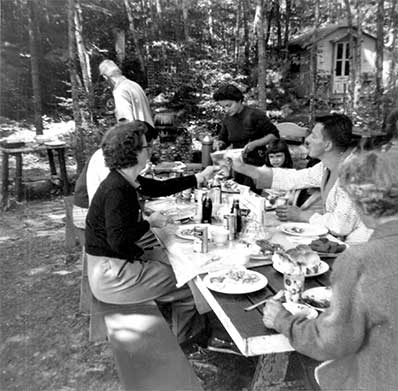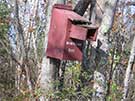
The wire spring and slam of the screen door. The sounds of linoleum under your feet. Rain on the tar paper roof, while you’re lying in bed. The smell of hay scented fern, the Eastern Wood Pewee’s plaintive song. Chipmunks eating seeds on the path to the outhouse. Perch chowder and fried horn pout, pickerel, and bass. Hot fluffy French bread. Diving off the wharf. Catching fireflies and pickerel minnows in a jar. Whippoorwills, “Hoot Owls,” bats, evening laughter and campfire stories, and cheating at cribbage. One month of heaven every August at the camp, Twin’s Nest, where all the Larouche sons and their families rendezvoused, matching their wits and prowess, as raconteurs, pranksters, fishermen, canoeists, and swimmers.

Hirundo Wildlife Refuge was founded in 1965 by Oliver Larouche. He was able to expand the original 3-acre family camp to the present 2,402-acre refuge with a generous endowment from Parker Reed, as a “haven for wildlife in which to grow and be protected, an area in which they can live and survive.” By planting fruit-bearing trees and shrubs, he increased habitat diversity to improve wildlife diversity.
In 1983 Oliver and his wife June Larouche deeded the Hirundo land to the University of Maine cementing a long-term collaboration. Oliver and June funded research on fish, birds, and mammals, transforming Hirundo into aliving laboratory for the University. Naming the refuge Hirundo, the Latin word for swallow, he lined the open fields with scores of tree swallow nest boxes and Pushaw Stream with Wood Duck nest boxes. The Parker Reed Shelter provides a forum for meetings. At Hirundo the public is encouraged to accept “Nature on its own terms.”

The Larouche family guides the Hirundo Board of Trustees to keep that acceptance and keep Oliver Larouche’s land legacy available for public enjoyment and education.